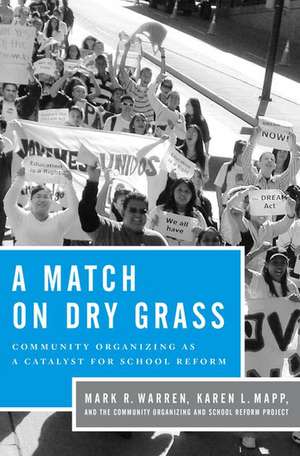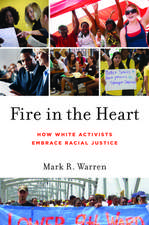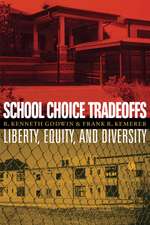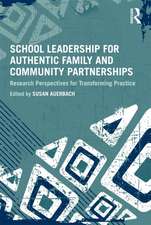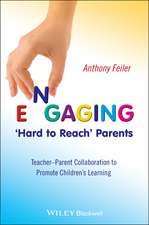A Match on Dry Grass: Community Organizing as a Catalyst for School Reform
Autor Mark R. Warren, Karen L. Mappen Limba Engleză Paperback – 29 sep 2011
| Toate formatele și edițiile | Preț | Express |
|---|---|---|
| Paperback (1) | 234.19 lei 31-37 zile | |
| Oxford University Press – 29 sep 2011 | 234.19 lei 31-37 zile | |
| Hardback (1) | 686.51 lei 31-37 zile | |
| Oxford University Press – 29 sep 2011 | 686.51 lei 31-37 zile |
Preț: 234.19 lei
Nou
Puncte Express: 351
Preț estimativ în valută:
44.82€ • 46.62$ • 36.100£
44.82€ • 46.62$ • 36.100£
Carte tipărită la comandă
Livrare economică 03-09 aprilie
Preluare comenzi: 021 569.72.76
Specificații
ISBN-13: 9780199793587
ISBN-10: 0199793581
Pagini: 328
Ilustrații: 18 b/w halftones, 3 b/w line
Dimensiuni: 152 x 231 x 25 mm
Greutate: 0.48 kg
Editura: Oxford University Press
Colecția OUP USA
Locul publicării:New York, United States
ISBN-10: 0199793581
Pagini: 328
Ilustrații: 18 b/w halftones, 3 b/w line
Dimensiuni: 152 x 231 x 25 mm
Greutate: 0.48 kg
Editura: Oxford University Press
Colecția OUP USA
Locul publicării:New York, United States
Recenzii
Civil rights activists in the 1960s insisted in the face of terror and death that national citizenship granted in the 14th Amendment meant something. That seminal work inspired organizing groups, active agents in an historic and on-going process, to bond with and bridge across racial, faith, gender, immigrant, and youth communities to reshape the narrative about the promise of citizenship. A Match on Dry Grass draws on these organizing traditions in the work to right 'the wrong this day done' in the nation's public schools. All of us doing that work will benefit from reading this book.
This is an important book for anyone interested in fundamental and sustainable school reform. Community organizing as described in A Match on Dry Grass creates new relationships, new community leadership, and new political power focused on doing what is right for kids. These are potent sources of support for true systemic change and an essential dimension to transforming our schools for the long haul.
In a context of top-down school reform preoccupied with changing administrative policies, the stories of bottom-up, community organizing initiatives in A Match on Dry Grass read like a breath of fresh air. Who better to spearhead educational reform than the young people, parents, teachers, and neighborhood residents who are committed to bringing about change in their communities? Simultaneously analytical yet full of practical organizing techniques, this important volume offers a provocative mosaic of not only what is possible, but what people are actually doing. A Match on Dry Grass's on-the-ground view of community organizing for school reform is must reading for those who see how important quality public education is for building a strong democracy.
For too long we have been waiting for Presidents, Governors and other self-declared superheroes to save our schools while overlooking the power and potential of local communities. This detailed study on community organizing for educational change in school districts and communities throughout the United States serves as a poignant lesson to those who are genuinely concerned about promoting educational change and a powerful reminder of what is possible when those with the most at stake take action to compel schools to improve.
A Match on Dry Grass locates the problems of public education as residing squarely in unequal power relations in a socially and economically stratified society. The diverse and engaging accounts of successful organizing efforts show that relational power develops where community organizing becomes a way of life without which sustained progressive educational change is neither possible nor desirable. This book is a treasure that I plan to reference again and again.
This is an important book for anyone interested in fundamental and sustainable school reform. Community organizing as described in A Match on Dry Grass creates new relationships, new community leadership, and new political power focused on doing what is right for kids. These are potent sources of support for true systemic change and an essential dimension to transforming our schools for the long haul.
In a context of top-down school reform preoccupied with changing administrative policies, the stories of bottom-up, community organizing initiatives in A Match on Dry Grass read like a breath of fresh air. Who better to spearhead educational reform than the young people, parents, teachers, and neighborhood residents who are committed to bringing about change in their communities? Simultaneously analytical yet full of practical organizing techniques, this important volume offers a provocative mosaic of not only what is possible, but what people are actually doing. A Match on Dry Grass's on-the-ground view of community organizing for school reform is must reading for those who see how important quality public education is for building a strong democracy.
For too long we have been waiting for Presidents, Governors and other self-declared superheroes to save our schools while overlooking the power and potential of local communities. This detailed study on community organizing for educational change in school districts and communities throughout the United States serves as a poignant lesson to those who are genuinely concerned about promoting educational change and a powerful reminder of what is possible when those with the most at stake take action to compel schools to improve.
A Match on Dry Grass locates the problems of public education as residing squarely in unequal power relations in a socially and economically stratified society. The diverse and engaging accounts of successful organizing efforts show that relational power develops where community organizing becomes a way of life without which sustained progressive educational change is neither possible nor desirable. This book is a treasure that I plan to reference again and again.
Notă biografică
Mark R. Warren is Associate Professor at Harvard Graduate School of Education and author of Fire in the Heart and Dry Bones Rattling. Karen L. Mapp is Lecturer in Education at the Harvard Graduate School of Education and author of Beyond the Bake Sale.The Community Organizing and School Reform Project at the Harvard Graduate School of Education, led by Mark R. Warren and Karen L. Mapp, consists of Keith Catone, Roy Cervantes, Connie K. Chung, Cynthia Gordon, Soo Hong, Ann Ishimaru, Paul Kuttner, Meredith Mira, Thomas Nikundiwe, Soojin Oh, Kenneth Russell, Amanda Taylor, Mara Tieken, Anita Wadhwa, and Helen Westmoreland.
